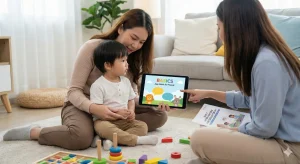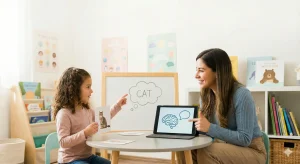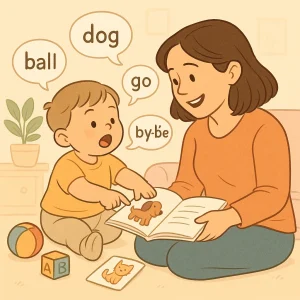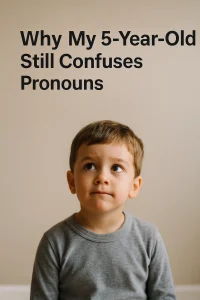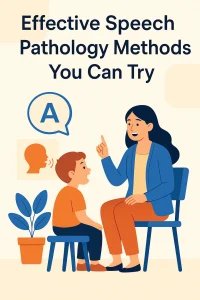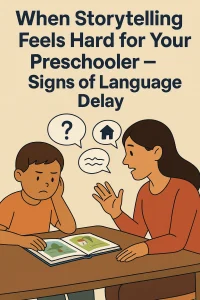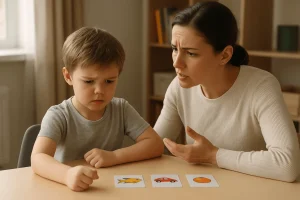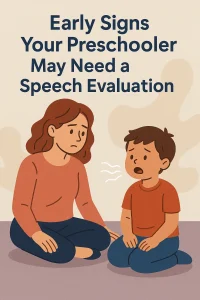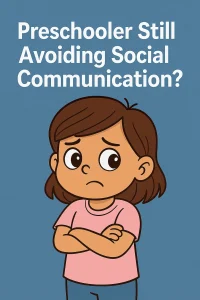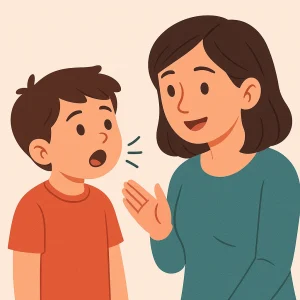Why isn’t My Toddler Talking Yet? Here’s What You Can Do
Last Updated: August 7, 2025
Worried your toddler isn’t talking yet? You’re right to notice — and early action makes a big difference.
If you’re feeling unsure or even a little worried because your toddler isn’t meeting communication milestones — you’re not alone. Many parents go through this. Maybe your child isn’t talking yet, doesn’t respond when called, or seems to communicate less than other kids their age. It’s easy to feel overwhelmed or wonder if you’re doing something wrong.
Free Speech Help for Kids
Concerned about speech delays? Book a free consultation with our expert speech therapist and get guidance tailored to your child’s needs.
What Are Communication Milestones for Toddlers?
Communication milestones are the small but important ways your child learns to express themselves and understand others. These aren’t just about talking — they include gestures, eye contact, pointing, making sounds, and understanding simple words. It’s how your toddler connects with the world.
Every child develops at their own pace, but there are general speech development milestones we expect to see around certain ages:
Around 12 Months
- Babbles with different sounds (like “ba-ba” or “da-da”)
- Responds to their name
- Uses gestures like waving or pointing
- Tries to imitate sounds they hear
- Understands simple words like “no” or “bye-bye”
Around 18 Months
- Says around 5–10 words (even if they’re not perfectly clear)
- Points to things they want
- Tries to name familiar objects
- Uses simple gestures along with words
- Follows simple instructions like “give me the toy”
Around 2 Years
- Says 50 or more words
- Starts putting 2 words together (like “more juice” or “mama come”)
- Follows short directions
- Points to pictures in books when named
- Shows interest in others and may copy their actions or speech
Around 3 Years
- Uses short sentences (3–4 words)
- Asks simple questions like “What’s that?”
- Talks about things that happened (even if briefly)
- Understands “in,” “on,” and other basic concepts
- Can be understood by familiar adults most of the time
Age-by-Age Guide to Toddler Speech Development
Every toddler is unique, but knowing what to expect at different ages can help you spot both progress and early signs of delay. Below is a simple, age-by-age guide to help you understand your child’s receptive language (what they understand) and expressive language (how they express themselves).
By 12 Months
- Receptive Language: Understands common words like “no,” “bye,” or their own name
- Expressive Language: Babbles using different sounds like “ba,” “da,” “ma”
- Uses gestures like waving or reaching
- Tries to imitate your sounds or facial expressions
- May say one or two simple words, like “mama” or “dada”
By 24 Months (2 Years)
- Receptive Language: Understands basic directions like “come here” or “sit down”
- Expressive Language: Says 50+ words
- Begins to join two words together (“want juice,” “go car”)
- Points to objects or pictures when named
- Uses simple phrases during daily routines
By 36 Months (3 Years)
- Receptive Language: Understands most simple questions and common verbs like “run,” “eat,” “sleep”
- Expressive Language: Uses 3-4 word sentences
- Asks simple “what” or “where” questions
- Tells brief stories or shares something that happened
- Can be understood by familiar adults most of the time
If your child is missing several milestones listed for their age, especially in both understanding and talking, it might be an early sign of delay. The sooner you explore support, the easier it is to build their skills.
Signs Your Toddler May Have a Speech or Language Delay
You might be wondering: “Why isn’t my toddler talking yet?” or “Is it normal if my 2-year-old says only a few words?” These are very common — and valid — questions many parents ask.
While all children develop at their own pace, there are some red flags that could suggest a possible speech or language delay. Being aware of these signs early can help you take the right steps at the right time.
Common Signs of a Delay to Look Out For:
- By 12 months: not babbling, not pointing, no response to their name
- By 18 months: not saying a few simple words (like “mama,” “ball,” or “no”)
- By 2 years: saying fewer than 50 words or not combining words
- Not using gestures like waving, nodding, or pointing
- Rarely making eye contact or not showing interest in people or surroundings
- Difficulty following simple instructions like “give me the toy”
- You feel they “understand less” than other kids their age
These signs can point to challenges in either receptive language (understanding) or expressive language (speaking). In some cases, both areas may be affected.
Read More: Receptive-Expressive Language Disorder: Signs and Help
What Could Be Causing the Delay?
Speech and language delays can happen for many different reasons:
- Hearing issues: If your child isn’t hearing sounds clearly, they may not learn how to imitate them
- Developmental delays: Some children simply need more time
- Autism spectrum: Children on the autism spectrum may also show delays in speech, social interaction, and eye contact
- Neurological or genetic factors: Less common, but sometimes delays are part of a broader developmental condition
Not all delays mean something serious — but it’s always a good idea to explore further if you notice any of these signs.
If you’re unsure, a quick chat with a professional can give you clarity. At Wellness Hub, our team offers free consultations to help you understand your child’s needs and recommend the best next steps — including online therapy, if needed.
What Should I Do If My Toddler Isn’t Meeting Communication Milestones?
If you’ve been asking yourself “What do I do if my toddler isn’t talking yet?” or “When should I worry about a speech delay?” — you’re already on the right path. Trust that feeling in your gut. As a parent, you know your child best.
It’s completely okay to act early. In fact, early support can make a big difference in how well your child develops communication skills. Whether your toddler is just starting to show signs of a delay or you’ve been concerned for a while, small steps — taken now — can lead to big progress.
Let’s look at two important things you can do: try simple activities at home and reach out for professional guidance when needed.
Steps You Can Take at Home
There are several ways you can gently encourage your toddler’s speech and language skills during your daily routine. These ideas don’t require any special tools — just your time and attention.
1. Narrate Daily Routines
Talk to your child while doing everyday things: “Let’s open the door,” “Time to wash hands,” or “You’re putting on shoes!” This builds understanding and word associations naturally.
2. Read Simple Picture Books
Choose books with clear pictures and repetitive words. Point to objects, name them out loud, and pause to let your child respond (even with a sound or look).
3. Use Gestures and Repetition
Wave, nod, point, and clap while saying words. Repeating simple phrases like “more juice” or “all done” helps build connections between words and actions.
These ideas may seem small, but they’re powerful. If you’re wondering how to help your toddler with a speech delay at home, this is a great place to start.
When to Talk to a Professional
If your child is around 18 to 24 months and still not saying many words, responding to names, or showing interest in communication — it’s time to check in with a professional.
Getting guidance early doesn’t mean there’s something wrong. It simply gives your child the best chance to catch up while they’re still in a critical learning phase.
Conclusion
If your toddler isn’t meeting communication milestones, don’t wait and worry. Early support can make a big difference. At Wellness Hub, you can talk to a speech therapist online — for free. It’s a friendly, no-pressure chat to understand your child’s speech needs and get expert advice. Whether your child is saying few words or none at all, we’ll guide you with simple tips or a personalized therapy plan. You’re not alone — we’re here to help.
Frequently Asked Questions:
1. When should I worry if my toddler isn’t talking?
If your child isn’t saying any words by 18 months or isn’t combining words by 2 years, it’s a good time to talk to a speech therapist. Early support can help them catch up.
2. What are normal communication milestones for toddlers?
- By 1 year: babbling and pointing.
- By 2 years: saying 50+ words and using two-word phrases.
- By 3 years: speaking in short sentences and asking simple questions.
3. Why isn’t my toddler meeting communication milestones?
It could be due to hearing issues, a speech delay, autism, or just late development. A professional can help find the reason and guide you.
4. Is it normal if my 2-year-old says only a few words?
Some children talk later than others, but by 2 years, most toddlers say at least 50 words. If your child says only a few, consider a speech evaluation.
5. What can I do at home to help my toddler talk?
Talk to your child during daily routines, read picture books, and use gestures. Repeat simple words often. These small things help speech grow.
6. Do toddlers grow out of speech delays on their own?
Some do, but many need support. It’s hard to tell who will catch up without help. That’s why early screening is a smart move.
7. Is speech delay a sign of autism?
It can be, but not always. Autism often includes other signs too — like poor eye contact or not responding to names. A therapist can help you understand the difference.
8. How do I know if my child has a communication delay?
Look for signs like no babbling by 12 months, few or no words by 18–24 months, or not following simple directions. Trust your instincts.
9. Where can I get help if my toddler isn’t talking?
You can talk to a licensed speech therapist at Wellness Hub for free. They’ll guide you with advice or a plan, if needed.
10. Is online speech therapy effective for toddlers?
Yes! Online therapy works well for toddlers when it’s personalized and play-based — like the sessions offered at Wellness Hub.
About the Author:
Shilpa Deshpande
Shilpa Deshpande is a skilled speech-language pathologist with over 14 years of experience. Fluent in Kannada, Telugu, Hindi, and English, she specializes in parent counseling, speech sound disorders, fluency assessment, and speech-language evaluations. Shilpa excels at working with children with developmental disorders, offering creative and effective therapy programs. Currently, at Wellness Hub, she holds a BASLP degree and is registered with the RCI. Her patience, ambition, and dedication make her a trusted expert in her field.
Book your Free Consultation Today
Parent/Caregiver Info:
Client’s Details:
* Error Message
